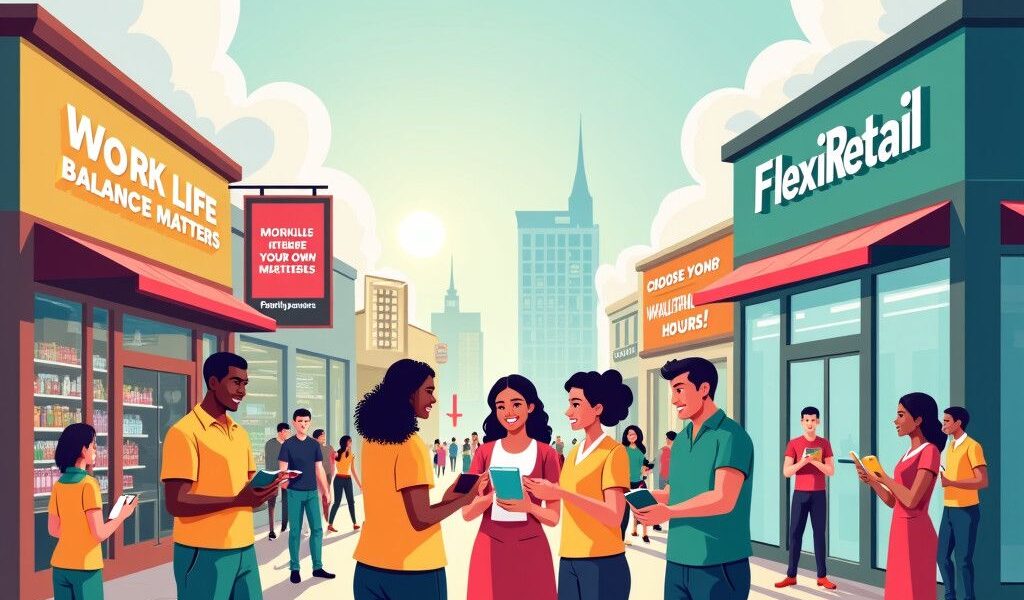The importance of flexibility cannot be overstated in today’s retail workforce. A recent study from Branch has underscored this reality, revealing that flexibility ranks as the most significant factor influencing the employment choices of hourly retail workers. The survey, which gathered insights from more than 3,000 workers across various retail sectors, found that a staggering 87% consider flexibility essential to their job satisfaction. This finding serves as a wake-up call for employers in the retail industry and highlights the need for adaptive workplace policies geared toward an increasingly diverse workforce.
In recent years, the retail landscape has experienced significant transformations, moving from conventional scheduling practices to more dynamic, worker-friendly options. As a result, flexibility has evolved from being seen as a perk to a necessity. Atif Siddiqi, CEO of Branch, aptly stated, “Flexibility is no longer a perk — it’s a necessity.” This sentiment resonates with many workers who are seeking to harmonize their professional and personal lives.
The implications of this trend are far-reaching. Retailers looking to attract talent must recognize that flexible schedules can lead to higher employee satisfaction and retention. For instance, companies like Starbucks and Target have implemented flexible scheduling systems that allow employees to swap shifts or choose their hours to a certain extent. Such systems not only empower workers but also contribute to a more engaged and productive workforce.
One of the driving forces behind the desire for flexibility is the younger generation of workers, particularly Millennials and Generation Z. These groups prioritize work-life balance more than previous generations. They are likely to gravitate towards employers who value their time and responsibilities outside of work. Data from various studies indicate that young workers are more willing to accept lower wages if it means having a job that offers considerable flexibility. Retailers that can adapt to these preferences will be better equipped to hire and maintain a robust workforce, ultimately leading to improved customer service and enhanced company performance.
Moreover, offering flexibility does not just mean allowing employees to set their schedules. It can also include options for remote work, particularly for roles that support online retail operations, as well as allowing employees to access their earnings in real-time. This is particularly appealing in a landscape where instant access to funds is increasingly recognized as a vital component of financial wellness. Companies that facilitate instant pay or earned wage access can see higher levels of employee satisfaction and loyalty.
Counter to initial reservations, providing flexibility may actually benefit retailers’ operational efficiency. Companies that adopt technology-driven scheduling tools can manage supply and demand more effectively while accommodating employee needs. Software solutions such as Deputy or When I Work allow for automated scheduling based on employee availability and preferences. This not only helps retailers fill shifts but also promotes a culture of trust and respect among staff members, reducing turnover rates that can be detrimental to business.
To illustrate this, consider the case of a national grocery chain that implemented a new scheduling system based on employee feedback. They found that after introducing more flexible scheduling options, employee turnover decreased by 25%, leading to significant savings in hiring and training. The resulting increase in employee morale also translated into improved customer service, positively impacting the brand’s reputation and sales.
However, it’s crucial for employers to approach flexibility thoughtfully. While offering flexible schedules is important, it should not come at the expense of fair pay or job security. Retailers must strike a balance and ensure that their employees feel valued and supported. Transparency in scheduling practices and clear communication about expectations can help build a more resilient workforce.
As we advance into 2024, it becomes clear that retailers who prioritize flexibility will stand out in a competitive job market. By fostering an environment that supports work-life balance, retailers not only attract a more diverse set of talent but also create a foundation for long-term success. The key takeaway is that flexibility is not merely a buzzword but a critical component of modern employment that can lead to a satisfied, engaged, and committed workforce.
In conclusion, flexibility has surged to the forefront of key considerations for hourly retail workers. Retailers must heed the findings of this survey and adapt their approaches to staffing and scheduling to meet the evolving needs of their employees. In a highly competitive landscape, those that prioritize flexibility will not just survive but thrive.











